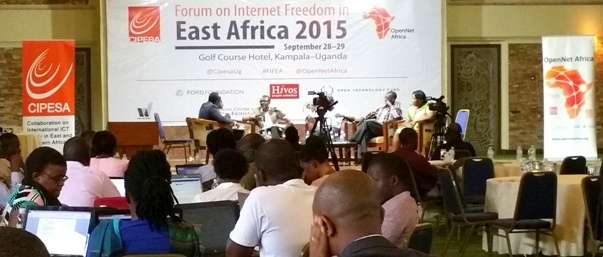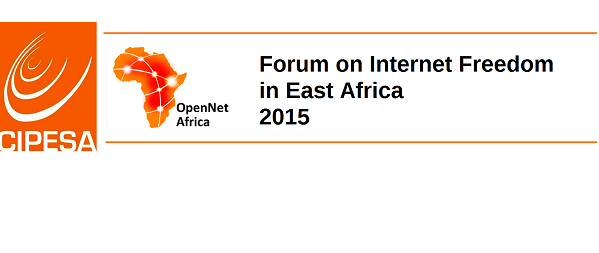By Juliet Nanfuka |
The recently concluded two-day Forum on Internet Freedom in East Africa 2015 sparked debate on the many facets of internet freedom, including access to information, digital safety, media freedom, online violence against women, regulation of the internet, freedom of expression online, and the online economy.
The first day of the Forum coincided with the internationally celebrated Right to Know Day (September 28) and also served as a platform to recognise the tenth anniversary of the Access to Information Act in the host country, Uganda.
The Forum, organised by the Collaboration on International ICT Policy for East and Southern Africa (CIPESA) under the OpenNet Africa initiative, brought together just under 200 participants, a dramatic increment from the 85 who participated at last year’s inaugural Forum. Participants represented a wide spectrum of stakeholders including communications regulators, civil society, intermediaries, private sector, tech enthusiasts, artists, media and ordinary citizens. It was supported by the African Centre for Media Excellence (ACME), Hivos, Ford Foundation, Open Technology Fund, UNESCO and Web We Want.
According to the ITU, there are currently 3.2 billion people using the internet of which, by end 2015, two billion will come from developing countries. There is therefore a need to create awareness and to advocate for internet rights in developing countries that are registering a dramatic uptake of the internet.
The African Declaration on Human Rights has set the foundation upon which human rights standards and principles of openness in internet policy formulation can be developed in Africa. While various policies and laws have been developed in the continent’s 54 countries, many contradict the rights to privacy, access to information, data security, and freedom of expression.
In his opening remarks at the Forum, Jaco du Toit, Communication and Information Adviser at the UNESCO Regional Office for Eastern Africa, pointed to growing concerns over the mechanisms used by governments in the region to monitor citizen’s activities both online and offline. These concerns threaten legitimate online interactions including by the media that plays the role of society’s watchdog, and by critical citizens with large online footprints and human rights organisations that rely on information to encourage civic participation and good governance.
The use of ICT tools by citizens to exercise their right to free expression and as an engine for development is widely recognised especially as the push for open data gains momentum across the African continent. However, recognition of internet rights in the same breath as the rights guaranteed offline by national constitution remains a grey area.
Internet Freedom in East Africa
The forum served as the launch of the State of Internet Freedom in East Africa 2015 report on access, privacy and security online in Burundi, Kenya, Rwanda, Tanzania, and Uganda. The report is the result of qualitative and quantitative research conducted in the focus countries between May 2014 and August 2015.
The report highlights legal developments related to internet freedom in each of the focus countries such as the May 2015 ruling by the East African Court of Justice (EACJ) against the Burundi Press Law of 2013, on the grounds that some sections went against the principles of press freedom. This marked a victory for the Burundi Journalists Union who had petitioned the court over the repressive law. In Kenya, the Security Laws (Amendment) Act was signed into law despite concerns over its expansion of the surveillance capabilities of the Kenyan intelligence and law enforcement agencies.
In Tanzania, the controversial Cybercrimes Act and the Statistics Act were both passed in 2015 notwithstanding protests due to the restrictions they place on advancing transparency and access to information.
Progressive public access developments are also reported such as the Smart Kigali initiative which provides wireless internet service on select public transport buses. The Ministry of ICT in Rwanda also launched the “Stay Safe Online” campaign aimed at promoting awareness on cyber security.
The report also presents some of the violations of internet freedom that were registered in East Africa over the last year.
Knowledge, Attitudes and Perceptions on Internet Freedom
The report found that understanding of what constitutes internet freedom among the region’s citizens is varied. The majority associated internet freedom with the ability to utilise the internet free of unwarranted state regulations or commercial restrictions.
Online safety practice was low with only 48% of the respondents using digital safety and security tools to safeguard themselves online. A lack of awareness of security risks on digital platforms and shortage of skills to secure communications were among the reasons for not actively utilising online safety tools.
The report further found widespread perception among East Africans of government surveillance even where there was limited evidence remain prevalent of actual surveillance. Respondents cited national security, countering terrorism, and combating hate speech as key reasons for government surveillance.
Discussion Echoes Report Findings
Discussions in the 13 sessions at the forum repeatedly pointed out contradictory or non-existent laws to protect users especially in instances where critical content in writing, or creative and performing arts have led to arrests. This in turn has contributed to self-censorship by independent content producers and media.
Further, victims of online violence against women (VAW) do not have any legal structures to ensure their rights are upheld; instead, many are castigated more than the perpetrators of the violence. Limited legal provisions on the vice have thus led to a culture of silence and misinformation which in turn impacts upon reporting of cases to indicate the extent and actual statistics of VAW in African countries.
Discussions at the forum echoed insights gathered in the report, including the friction between control of content which impacts upon freedom of expression and regulation of the internet so as to combat hate speech and terrorism, and to maintain national security and public order.
“Ignorance of the law is not an excuse,” said Irene Kaggwa, Head of Research and Development at the Uganda Communication Commission on the need for responsible use of the internet. Jimmy Haguma, Acting Commissioner with Uganda Police’s Cybercrimes unit, , added that “freedom without control” would contradict certain needs, such as ensuring child online safety and protection from theft and fraud.
The challenges involved with ensuring that the internet is a safe space for genuine interaction were summarised by Facebook’s head of Public Policy for Africa, Ebele Okobi, who noted that “If Facebook were a country, it would be the biggest country in the world.” She added that the global platform faces a challenge of how to apply the laws of every country in which it has users in its policy on online content.
Underpinning all discussions at the forum was the use of social media and the need for users to build their digital security capacities as the online arena increasingly becomes the key avenue for social interaction. However, legislation in many countries has not moved fast enough to ensure the protection of users who fall victim to online abuse and violence.
In his closing remarks, Vincent Bagiire, Chair of the ICT Committee, Parliament of Uganda, emphasised the necessity for further engagement on internet freedom not only by civil society but with a more inclusive multi-stakeholder approach which works towards ensuring a free and open internet. He stated that this responsibility exists first at the national level, “but given the borderless, global nature of the internet”, it is also very much a global issue. “Internet freedom is both a domestic and a foreign policy subject,” he said.
The Forum had representation from 19 countries including Burundi, Cameroon, Democratic Republic of Congo, Ethiopia, Germany, Italy, Kenya, Nigeria, Rwanda, Tanzania, South Africa, South Sudan, Sudan, Somalia, Uganda, United Kingdom, United States of America, Zambia, Zimbabwe
For more details, visit the Forum on Internet Freedom in East Africa 2015 page, See the full programme and the speaker biographies.
The Challenge of Tackling Online Violence Against Women in Africa
By Evelyn Lirri |
The story of a 19-year-old student from Kenya who committed suicide after a man she met through Facebook threatened to publish her nude photos came to the limelight on the heels of the opening day of the Forum on Internet Freedom in East Africa, which took place in Kampala, Uganda.
The forum, organised by the Collaboration on International ICT Policy for East and Southern Africa (CIPESA), under the OpenNet Africa Initiative, drew a cross-section of people from Africa and beyond, including human rights defenders, academics, , law enforcement officers, communication regulators, media, and the tech community to debate issues impacting online freedom of expression and cyber security in Africa. The emerging issue of online violence against women (VAW), a growing problem worldwide, was among the key topics discussed.
Panelists at the Forum said cyber violence against women exists in several forms, including stalking, sexual harassment, surveillance, revenge pornography, public shaming and use of images or videos to manipulate individuals. It is particularly carried out through email, social media such as Facebook, Twitter and mobile phone instant messaging platforms like WhatsApp.
Ruth Nsibirano, a gender expert from Makerere University, said it is difficult to quantify the extent of cyber VAW in Africa because of several inhibitions including the culture of silence.
“In many cases when women report this kind of violence, they are blamed for causing it and so they end up keeping quiet instead of speaking out,” explained Dr. Nsibirano. She added that many women were reluctant to report their tormentors because of the fear of reprisal and, in other cases, they did not know where to seek redress.
According to Jan Moolman, a feminist activist with the Association for Progressive Communications (APC) who was on the panel that discussed gender-based online violence, women’s access to the internet and technology remains low, especially in developing countries, leaving the conversation on internet rights to be dominated by men. She noted that in some African countries, online VAW was targeted at public figures, largely because of the nature of their work.
“We need policies and legislation by governments to say this kind of behaviour online is unacceptable. Just like we are responding to violence against women offline, we need to do the same online,” said Ms. Moolman.
Despite the ongoing reports of harassment and intimidation, Ms. Moolman urged more women and girls to join online spaces in order to be part of the conversation against the vice and how to ensure they are safe when they use different online platforms.
Nanjira Sambuli, a research manager with iHub Kenya, said cases of violence against women are usually difficult to prosecute because the evidence is hard to present.
“The cases that come to the limelight are likely a representative of what we don’t hear or see. We need to work towards frameworks that allow people to report anonymously. That way, we shall have a better sense of what is happening,” she said.
Ms. Sambuli highlighted the fact that efforts to combat violence against women have thus far been mainly offline, with fewer strategies put in place to document the harm that happens online and ensure women know where to seek help when they have been violated.
“The internet especially social media platforms are spaces where people are beginning to negotiate and understand what it means to have freedom and what the boundaries are. The internet should be a space where citizens can engage, learn and build a better society,” she added.
Among the possible efforts to curb the vice, Dr. Nsibirano called for increased education of women on the dynamics of the internet through school curriculums. “That way, we shall get more women who will be knowledgeable when these crimes happen,” she said.
Many countries across Africa do not have specific laws under which offenders can be prosecuted. In Uganda, some offenders have been charged under the Anti Pornography Act, 2014, but participants noted that this law was not sufficient to address the problem given that the same law could be used to prosecute the victims.
“Digital evidence is an area that the world is still trying to figure out,” noted Ms. Sambuli. She stressed the need for laws not to aggravate the infringement of victims’ privacy during investigations and prosecution of VAW crimes.
Access to Information in Uganda to be Recognised at Internet Freedom Forum
As part of its OpenNet Africa initiative which is aimed at promoting internet rights in Africa, the Collaboration on International ICT Policy for East and Southern Africa (CIPESA) is next week set to host the second Forum on Internet Freedom in East Africa. The two-day event is scheduled for 28 and 29 September 2015, in Kampala, Uganda and will coincide with the International Right to Know Day.
Uganda was the first of two countries in East Africa to adopt an Access to Information Act (ATIA) in 2005 (the other is Rwanda in 2013) which promotes the right of access to information and supports public participation in decision-making processes. As part of the forum the Ministry of Information and National Guidance in the Office of the Prime Minister (Uganda) in partnership with CIPESA and the Africa Freedom of Information Centre (AFIC) will celebrate the 10th anniversary of ATIA, host discussions to evaluate the implementation of the law, how to overcome challenges on implementation and proposals for amendments. The second State of Right to Information (RTI) in Africa report will also be presented.
In Africa, Government Ministries, Departments and Agencies (MDAs), Civil Society Organisations (CSOs), the private sector, academia and ordinary citizens are increasingly utilizing online tools for social and economic engagement, online debate, advocacy and business development. The Forum will serve as a platform to discuss how the current state of internet freedoms in Africa affects these engagements. Further, it will also explore the threats online engagements face, how emerging global issues impact upon local users, as well as the opportunities for action to promote access, privacy and security online.
The 2015 edition of the State of Internet Freedom in East Africa Report will be launched at the Forum.
Ashnah Kalemera, Programmes Associate at CIPESA, says that, “This report is the culmination of exploratory research conducted in Burundi, Ethiopia, Kenya, Rwanda, Tanzania and Uganda into the threats to access, privacy and security online, as well as the knowledge, attitudes and practices of citizens on internet freedoms in these countries. The insights gathered can help guide policy makers, civil society, telecommunication regulatory authorities in understanding the internet freedom landscape in the region including the challenges, opportunities and developments.”
According to the International Telecommunication Union, by the end of 2015, there will be 3.2 billion users of the internet, of which 2 billion will come from developing countries. This translates to 34% of households in developing countries accessing the Internet, compared with more than 80% in developed countries. In the report focus countries, internet penetration in Burundi stands at 4.9% (2013 statistics), while according to 2014 statistics, Kenya had a penetration of 52%, while Rwanda was 20%, Tanzania at 4.8% and in Uganda at 20%.
The Forum brings together human rights defenders, journalists, government officials, academia, bloggers, developers, the arts community, law enforcement agencies and communication regulators, all of whom have a role to play in advancing the rights of citizens to privacy and freedom of expression in the online sphere.
Participants confirmed to attend hail from Burundi, Cameroon, Democratic Republic of Congo, Ethiopia, Germany, Italy, Kenya, Nigeria, Rwanda, Tanzania, South Africa, South Sudan, Sudan, Somalia, Uganda, United Kingdom, United States of America, Zambia, and Zimbabwe.
Speakers at the panel will come from organizations including Article 19, Bayimba (Uganda), Bloggers Association Kenya, Chapter 4, ICT Association Uganda (ICTAU), Globaleaks, Global Voices (Uganda), Great Lakes Voices (Rwanda), Hub for Investigative Media (HIM), iHub Research (Kenya), Internet Society [(Africa, Burundi and Uganda Chapters], Jamii Forums (Tanzania), UNESCO, Facebook, Kenya ICT Action Network (KICTANet), Makerere University (Uganda), Media Institute of Southern Africa (MISA), Paradigm Initiative Nigeria, Protège QV, Uganda Media Centre, Uganda Communications Commission (UCC), Uganda Police Cybercrime Unit, University of Nairobi, Web We Want, Writivism (Uganda) and the Women Of Uganda Network (WOUGNET) among others.
Topics to be discussed include electioneering and extremism in the digital age, press freedom, access to information online, the economics of the internet, digital safety, online violence against women and cybercrime. See the Programme.
We are thankful for the support received from the African Centre for Media Excellence (ACME), Ford Foundation, Hivos, Open Technology Fund, UNESCO and Web We Want.
Forum on Internet Freedom in Africa 2016 – Speakers
 Angela Kilusungu | Culture and Development East Africa (CDEA) |
 Zawadi Nyongo | Independent Consultant |
 Neil Blazevic | Defend Defenders |
 Enrico Colander | Research ICT Africa |
 Martha Chilongoshi | Panos Southern Africa |
|
Forum on Internet Freedom in East Africa
The Collaboration on International ICT Policy for East and Southern Africa (CIPESA), under the OpenNet Africa initiative, is proud to announce the upcoming Forum on Internet Freedoms in East Africa. The two-day Forum is scheduled for 28 – 29 September 2015, in Kampala, Uganda, to coincide with the International Right to Know Day.
During the Forum, we’ll discuss the current state of internet freedoms in Africa, including threats, emerging issues, and opportunities for action to promote access, privacy and security online. The Forum brings together human rights defenders, journalists, government officials, academia, bloggers, developers, the arts community, law enforcement agencies and communication regulators, all of whom have a role to play in advancing the rights of citizens to privacy and freedom of expression in the online sphere. At the inaugural 2014 forum, we hosted 85 participants from Burundi, Kenya, Nigeria, Tanzania, Rwanda, and Uganda.
Visit the Forum page for more information and application form.




